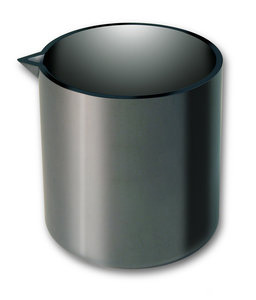SPI-Glas 22 Glassy Carbon, Glassy Carbon Beaker
| Size | 38 ml |
|---|---|
| Item | 4223GCB-AB |
| Availability | In Stock |
| Size | 50 ml |
|---|---|
| Item | 4224GCB-AB |
| Availability | In Stock |
| Size | 115 ml |
|---|---|
| Item | 4225GCB-AB |
| Availability | In Stock |
| Size | 275 ml |
|---|---|
| Item | 4226GCB-AB |
| Availability | In Stock |
| SPI Supplies # Part Number |
Description | Vol (ml) | Dia (mm) | Height (mm) | Wall Thick (mm) |
|---|---|---|---|---|---|
| 4223GCB-AB | BAG 38 | 38 | 38 | 50 | 3 |
| 4224GCB-AB | BAG 50 | 50 | 39 | 59 | 3 |
| 4225GCB-AB | BAG 115 | 115 | 54 | 70 | 3 |
| 4226GCB-AB | BAG 275 | 275 | 74 | 82 | 3 |
| 4227GCB-AB | BAG 430 | 430 | 90 | 86 | 3 |
Glassy carbon is a unique material and exhibits properties entirely different from other forms of carbon. The vitreous glassy carbon beakers offered by SPI Supplies is a SPI-Glas 22 Grade and are plug-in compatible in many applications where presently only Pt beakers are being used. Their low economical cost, relative to platinum makes them especially in demand in days of shrinking research budgets. The very high density of the product literally prevents many molten materials from spreading on the glassy carbon surface. And the high density prevents any of the molten species from leaching into the glassy carbon surface.
SPI-Glas Glassy Carbon Beakers have a built-in pouring spout for ease of use. Use these beakers where the highest purity is required.
Chemical resistance:
Theoretically, glassy carbon should behave like any other form of carbon, such as graphite, but in fact, it is far less reactive because of the higher density relative to the normally more porous graphite. Its resistance is more akin to HOPG and high-density pyrolytic graphite.
Thermal properties:
The material can be taken to 1100°C without any significant devitrification. However above that temperature, some devitrification will occur, and there will be a nucleation and growth of a graphite phase. Also note that SPI Glas glassy carbon products can be heated in air up to 500°C without undergoing any reaction but above this temperature, any heating should be done strictly either under vacuum or in an environment of argon.


